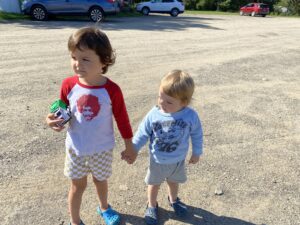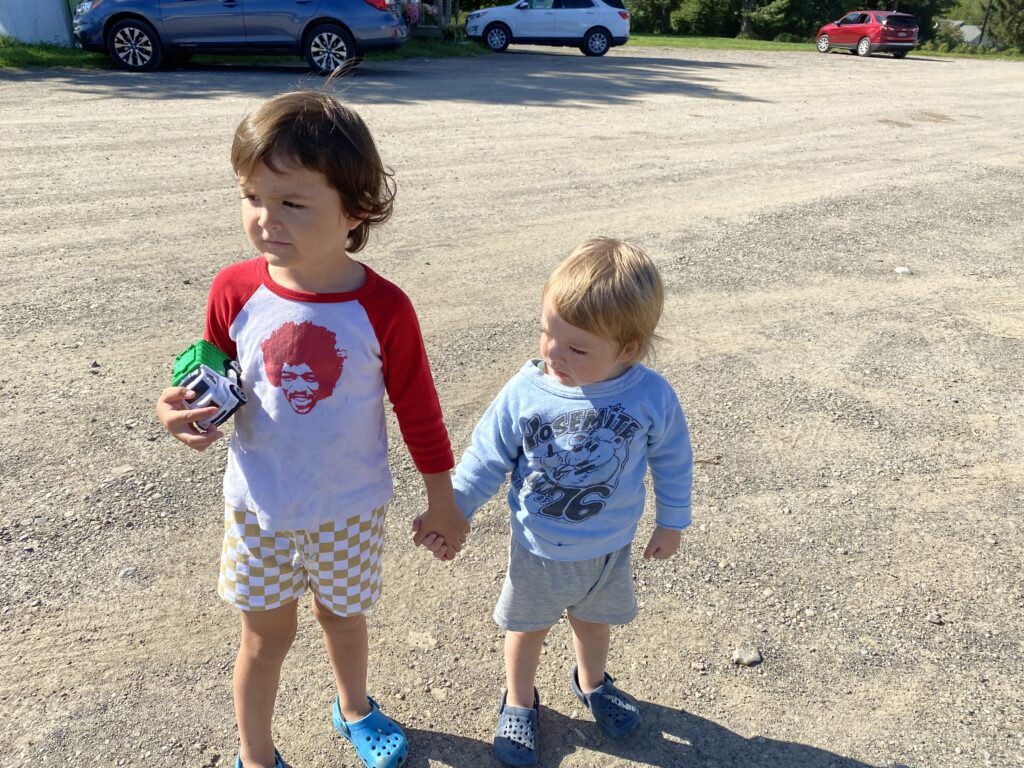September 2024
Today’s article has been written by Judith Frizlen, a beloved teacher of LifeWays and mentor to caregivers.

In my roles as the fourth child in a family of eight, a teacher, a parent and a grandparent, I have been fascinated by differences in children related to birth order.
When you are striving to understand young children, it is helpful to have a picture of their family. In my first year of teaching, most of the students were either the first born or the only child in their family. I saw that they shared certain characteristics including: a strong drive, a desire to get things right, and a close attachment to their parents.
They taught me a lot about developing my own authority as a teacher. I noticed if I displayed a lack of clarity, they would step right in and as you probably know, children do not make the best leaders. First-borns or not.
This led me to research birth order, beginning with “Brothers and Sisters” by Karl Koenig.
In this book, Koenig writes about the fundamental approach to the “world” as related to birth order.
“The first-born attempts to conquer the world. They focus on the parents.
The second-born tries to live in harmony with the world. They focus on the older sibling.
The third-born is inclined to escape the direct meeting with the world and is free to focus on their own interests.”
This orientation is repeated with subsequent children in the family. Children show this approach to life early on, as I learned when our first-born grandson was getting used to having a little brother. The grandchildren know my husband and I as Omi and Opi.
The following story illustrates a typical first-born reaction to the arrival of a sibling. It is from the book, “Where Wisdom Meets Wonder, Forty Stories of Grandma Love”.
Big Brother always loved shopping with Opi, especially putting grapes into the cart and nibbling them while they walked the aisles of the store. At home, while Opi emptied the grocery bags, one of the games Big Brother liked to play, was removing grapes from the bag and lining them up on the table according to size. There was: Papa Grape, Mama Grape, Little Grape (which until that time had been him), Omi and Opi Grapes, and Uncle Jay. Sometimes he included the dogs, but you get the idea. His world was defined by the people in it. Nothing else mattered more, even his toys. He loved knowing his people and naming them. And yes, when Little Brother arrived, he needed to add another grape to the line-up, but first there was some getting used to the idea.
When Mama was nursing Little Brother, Big Brother would try to eke out a spot on her lap. He spent a lot of time with Papa, helping him do repairs around the house or gathering up laundry from the basement. He loved his bath time, basking in the warm water and the undisturbed attention of one of his parents.
We spent time with Big Brother on Saturdays, providing a respite from the new world he was living in. One Saturday, after the weekly food shopping trip, lunch and nap, there was a surprise: Little Brother showed up at Omi and Opi’s.
Yes, Mama and Papa dropped him off so they could run an errand. And we added a grape to the cluster from the store, which was not yet lined up in order. Babies, as you probably know, require a great deal of care, so when Little Brother looked for attention, he got it. After all, we were welcoming him into Omi and Opi’s world.
And Big Brother started a “look at me” game. He tried to grab the attention away from Little Brother in any way possible. We had never seen these behaviors and were dismayed by our dear number one grandson’s capacity to disrupt the peace. Our little angel was acting like a demon! The bowl of grapes he once used to create a picture of order in his world was dumped on the floor. His world had been upended, so that’s what he tried to do with everything in it!
It took me a minute to realize what was going on. In his toddler way, he was coming to understand that Little Brother lived in his home, but until that Saturday afternoon, he had no idea that Little Brother would also have a place in Omi and Op’s home. That meant that Big Brother had to share not only Mama, Papa, and Otis, the dog – he had to share Omi and Opi, too.
That came as a surprise for Big Brother – one he found hard to swallow. As adults, we understand that young children are immature social beings, and we know sharing is a learned skill. But we did not expect that Big Brother would claim Omi and Opi as his own people and would have to learn about sharing them, too. After that day, we continued Saturdays at Omi and Opi’s for Big Brother, at times with Little Brother, too, but sometimes with Big Brother alone. And when he made his family picture from grapes, blocks, or whatever else was handy, he learned to include Mama, Papa, Otis the dog, Omi and Opi, Uncle Jay – and Big Brother and Little Brother.

This story illustrates that the child learns how life works from experience which wires their brains for whatever is happening in their world. A first-born child will have learned that they have the undivided attention of adults. When another child comes along, it is normal for the child to have a learning curve integrating how to share what they once thought was exclusively their own. As soon as a second child is born, sibling rivalry begins.
Rather than judge children’s behaviors as good or bad, learning about the birth order effect helps us understand them. This makes all the difference in how we interact with a child who is struggling. Typically, adults want to put an end to conflict as quickly as possible and we do need to protect little ones from harm, but if a child is given space to work through their feelings about a new sibling, they can begin forging one of life’s most profound relationships.

It helps us to be able to accept and support children in learning to navigate an impactful change in their world. And in this way, connections with adults which the first-born values so much, are maintained.
You might find that learning about birth order provides deeper understanding of yourself and others. That’s why I created the “Birth Order Effect” workshop. Join us on September 19th and 26th from 7:00 until 8:30 p.m. EST to learn more. Judith also wrote another article on the topic of Birth Order here!
Click Here to Learn More about Judith’s Workshop
